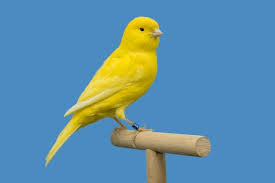
Canary
Conditions of detention
Canaries require a comfortable and spacious cage that allows them to fly and exercise. The cage should be equipped with perches of different sizes and materials to promote foot health. It’s important to place the cage in a well-lit area away from drafts and direct sunlight.
Useful Fact: Canaries are sensitive to changes in temperature and air quality, so maintaining a stable environment is crucial for their health.
Nutrition and diet
A balanced diet for canaries includes high-quality seeds or pellets supplemented with fresh fruits and vegetables. Foods such as apples, carrots, spinach, and kale are excellent additions to their diet.
Useful Fact: Canaries require a diet rich in seeds, but providing a variety of fresh foods can help prevent nutritional deficiencies and promote overall health.
Health
Canaries are generally healthy birds but can be susceptible to certain health issues such as respiratory infections, mites, and egg-binding in females. Regular veterinary check-ups are important for early detection and prevention of diseases.
Useful Fact: Monitoring their droppings can provide early signs of health issues; changes in color or consistency can indicate a problem.
Grooming and care
Canaries keep themselves clean through regular preening and enjoy bathing. Provide a shallow dish of water for them to bathe in or mist them lightly with water to help them maintain healthy feathers.
Useful Fact: Regularly clean the cage, including perches and dishes, to prevent bacterial growth and ensure a hygienic environment.
Education and training
Unlike parrots, canaries are not typically trained to perform tricks or mimic sounds, but they can become accustomed to their owner’s presence and routines. Handling should be minimal to avoid stress.
Useful Fact: Male canaries are known for their singing ability, and providing a quiet environment can encourage them to sing more frequently.
Toys and entertainment
Canaries enjoy toys that stimulate their natural behaviors, such as swings and ladders. These provide mental and physical stimulation and help prevent boredom.
Useful Fact: Rotate toys regularly to maintain interest and prevent boredom, and ensure toys are made from safe materials.
Safety
Safety considerations include ensuring that the cage is free of sharp edges and that the bar spacing is appropriate to prevent escape or injury. Keep them away from toxic substances, including certain household plants and fumes.
Useful Fact: Avoid using non-stick cookware around canaries, as the fumes can be toxic and even fatal to birds.
Accessories
Essential accessories for canaries include perches, food and water dishes, and a cuttlebone for calcium supplementation. Ensure that these accessories are safe and appropriately sized for canaries.
Useful Fact: Using perches of different diameters can help maintain foot health by preventing pressure sores.
Socialization
Canaries are generally solitary birds and do not require companionship, although they can be housed with other canaries in large aviaries. They thrive on routine and enjoy interaction with their owners.
Useful Fact: If you have a single canary, spending time near their cage and talking to them can provide social interaction without causing stress.
Travel and Transportation
When traveling with canaries, use a secure and well-ventilated travel cage. It’s important to keep the cage covered during transport to reduce stress.
Useful Fact: Familiarize your canary with the travel cage by placing it in their living space and allowing them to explore it before any trips.
Behavior and psychology
Canaries exhibit a range of behaviors and vocalizations that indicate their mood and health. Understanding these signals is essential for proper care.
Useful Fact: A content canary will often sing, chirp, and show interest in its surroundings, while a stressed or unhappy bird may become quiet or exhibit feather plucking.
Legal aspects
In most areas, there are few legal restrictions on keeping canaries as pets, but it is important to ensure that any canaries purchased are from reputable breeders or pet stores, and not taken from the wild.
Useful Fact: Always check local regulations to ensure compliance with laws regarding pet ownership and breeding.


